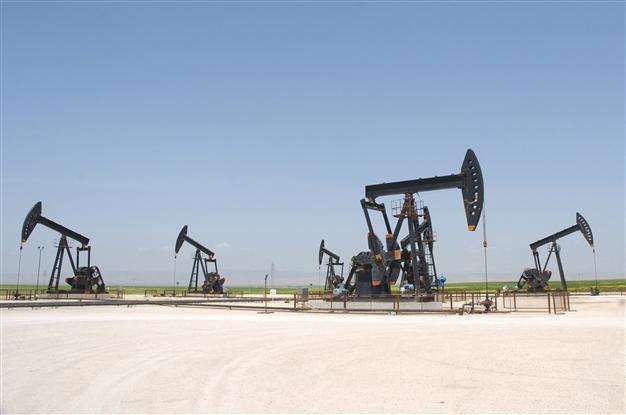Turkish dealers helping ISIL earn $1 million per day from oil: US Treasury
WASHINGTON – The Associated Press

This file picture shows oil pump jacks pumping oil at the al-Jbessa oil field in is Syria's Hasakah governorate. REUTERS Photo
The Islamic State of Iraq and the Levant (ISIL) is earning about $1 million a day from black market oil sales, the United States has said, vowing to impose harsh sanctions on the purchasers of the oil, “including middlemen from Turkey.”“With the important exception of some state-sponsored terrorist organizations, ISIL is probably the best-funded terrorist organization we have confronted,” David Cohen, U.S. Treasury Department undersecretary for terrorism and financial intelligence, said in a speech at the Carnegie Endowment for International Peace in Washington on Oct. 23. “It has amassed wealth at an unprecedented pace.”
ISIL is generating tens of millions of dollars a month through a combination of oil sales, ransom, extortion and other criminal activities, and support from wealthy donors, said Cohen, laying out the most comprehensive outline yet of the U.S. financial strategy against the group.
“It is difficult to get precise revenue estimates ... but we estimate that beginning in mid-June, ISIL has earned approximately $1 million a day from oil sales,” Cohen said. Other estimates have ranged as high as $3 million a day.
Middlemen in Turkey
The undersecretary said ISIL was selling oil at substantially discounted prices to a variety of middlemen, including some from Turkey, who then transport the oil to be resold. “It also appears that some of the oil emanating from territory where ISIL operates has been sold to Kurds in Iraq, and then resold into Turkey,” he said.
However, the U.S. official also praised Turkey and the Kurdistan Regional Government (KRG) for being “committed to preventing ISIL-derived oil from crossing their borders.”
He also said U.S.-led airstrikes on ISIL refineries in Syria were also working to threaten the group’s supply networks, dashing a major blow its resources.
Cohen acknowledged, however, that ISIL moves oil in illicit networks outside the formal economy, making it harder to track.
“But at some point, that oil is acquired by someone who operates in the legitimate economy and who makes use of the financial system. He has a bank account. His business may be financed, his trucks may be insured, his facilities may be licensed,” he said.
“We not only can cut them off from the U.S. financial system and freeze their assets, but we can also make it very difficult for them to find a bank anywhere that will touch their money or process their transactions,” he said.
The Treasury also is going after individuals who donate money to ISIL and is urging officials in Qatar and Kuwait to do more to target terror financiers in their countries. A key, he said, is to restrict the militant group’s access to the international financial system.
















